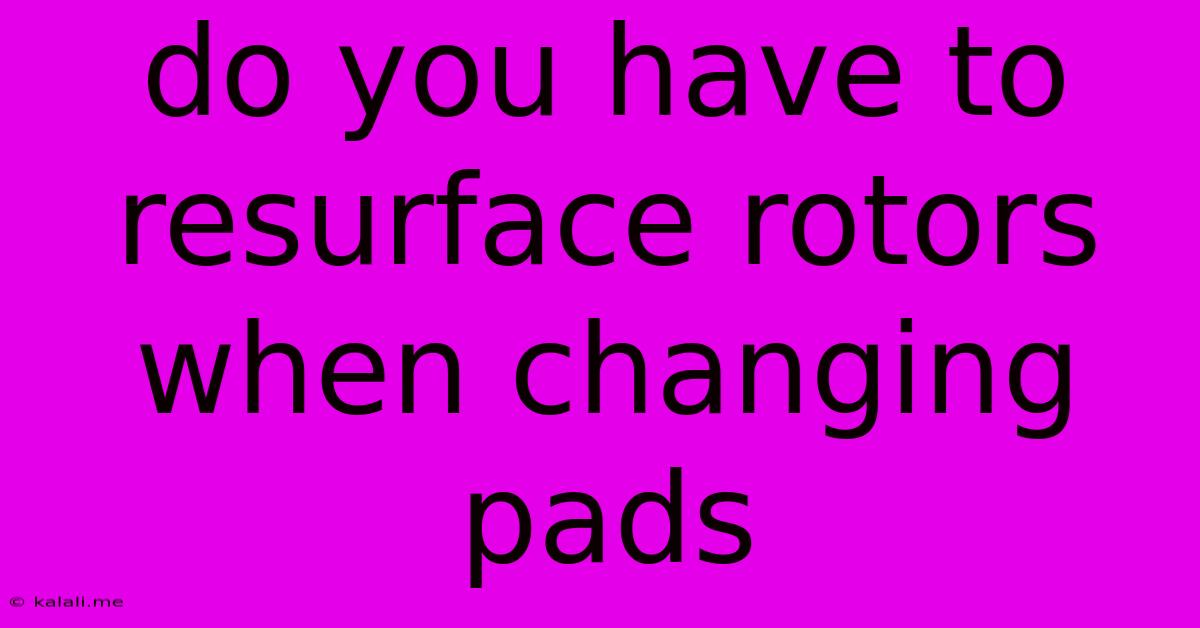Do You Have To Resurface Rotors When Changing Pads
Kalali
Jun 11, 2025 · 3 min read

Table of Contents
Do You Have to Resurface Rotors When Changing Pads? A Comprehensive Guide
Changing brake pads is a relatively straightforward DIY car maintenance task. But the question of whether rotor resurfacing is necessary during a pad change often arises. This guide explores the factors determining whether your rotors need resurfacing, the benefits and drawbacks, and when professional help is advisable.
Understanding Brake Rotors and Pads: Brake rotors (or discs) are metal discs that rotate with the wheels. Brake pads, friction materials clamped against the rotors, create the stopping force. Over time, braking wears down both the pads and the rotors. The pads are easily replaced, but the rotors require more consideration.
When Rotor Resurfacing is Necessary
Several factors determine if you need to resurface your rotors when changing brake pads:
-
Minimum Thickness: Each rotor has a minimum thickness specified by the manufacturer. If the rotor's thickness has worn down to this minimum, resurfacing isn't an option; replacement is necessary. You can find this specification in your vehicle's owner's manual or consult a reliable online parts database.
-
Visible Grooves or Scoring: Deep grooves, scoring, or uneven wear on the rotor surface significantly compromise braking performance. This indicates a need for resurfacing or replacement. Shallow scoring, often seen as minor surface imperfections, may not necessitate resurfacing immediately, but close monitoring is recommended.
-
Excessive Runout: Runout refers to the rotor's wobble. Excessive runout impairs braking efficiency and can cause vibrations during braking. A mechanic can measure runout precisely, and excessive values often necessitate resurfacing or replacement.
-
Pulsed Braking: Noticeable pulsing or vibration in the brake pedal during braking is frequently a symptom of warped rotors. Resurfacing corrects this warping, restoring smooth braking.
Benefits of Rotor Resurfacing:
- Cost Savings: Resurfacing rotors is generally cheaper than replacing them entirely.
- Extended Rotor Lifespan: Resurfacing removes the worn layer, effectively extending the rotor's operational life.
- Maintains Original Equipment Quality (OEM): If possible, resurfacing preserves the original rotor's material properties and balance, preferable to a replacement.
Drawbacks of Rotor Resurfacing:
- Not Always Possible: As mentioned, severely worn rotors cannot be resurfaced.
- Reduces Rotor Thickness: Each resurfacing reduces the rotor's thickness, bringing it closer to the minimum thickness limit. Repeated resurfacing eventually necessitates rotor replacement.
- Potential for Damage: Improper resurfacing can damage the rotor, leading to performance issues or even failure.
When to Resurface vs. Replace Rotors:
- Minor Wear and Scoring: If the wear is minimal and the rotor thickness is well above the minimum, resurfacing is usually sufficient.
- Significant Wear, Grooves, or Warping: If the wear is significant, deep grooves are present, or there's noticeable warping or runout, replacement is likely the best course of action. Trying to resurface severely damaged rotors could risk further issues.
- Rust or Corrosion: Extensive rust or corrosion might compromise the structural integrity of the rotor, and replacement is the safer option.
DIY vs. Professional Resurfacing:
While changing brake pads is manageable for DIY enthusiasts, rotor resurfacing is best left to professionals. Specialized equipment is needed to ensure accurate and even resurfacing, preventing damage or imbalance. Improper resurfacing can lead to compromised braking performance, potentially dangerous consequences.
In conclusion, determining whether rotor resurfacing is necessary when changing brake pads requires careful assessment. Consider the rotor's thickness, presence of grooves or scoring, runout, and overall condition. While resurfacing provides cost savings, prioritizing safety and performance means opting for professional help or outright replacement when necessary. Always refer to your vehicle's owner's manual for specific recommendations.
Latest Posts
Latest Posts
-
Truth Table For 3 Input Nand Gate
Jun 12, 2025
-
What Are The Colours Of The Five Olympic Rings
Jun 12, 2025
-
Moment Of Inertia Of A Semicircle
Jun 12, 2025
-
What Is The Molar Mass Of Hno3
Jun 12, 2025
-
Which Of The Following Diseases Is Caused By A Virus
Jun 12, 2025
Related Post
Thank you for visiting our website which covers about Do You Have To Resurface Rotors When Changing Pads . We hope the information provided has been useful to you. Feel free to contact us if you have any questions or need further assistance. See you next time and don't miss to bookmark.